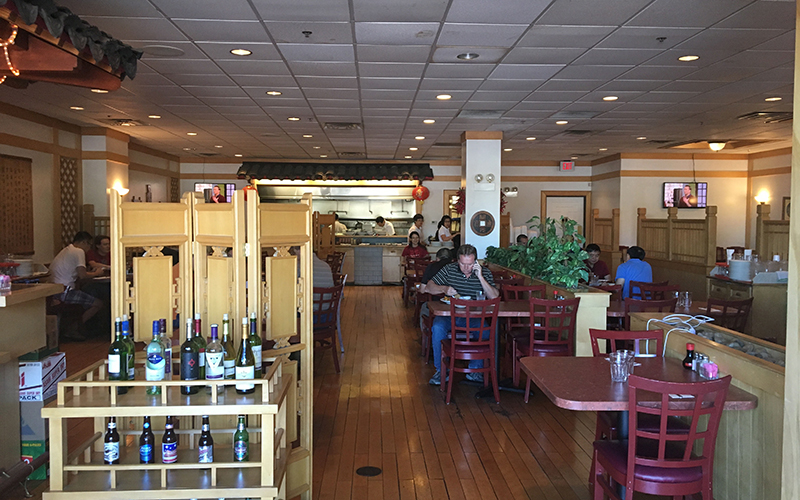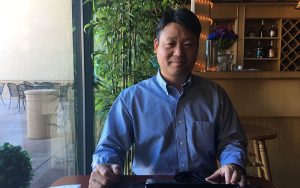
Patrons eat lunch Thursday at the Szechwan Palace located in the Chinese Cultural Center. (Photo by Angelica Cabral/Cronkite News)
PHOENIX — The future of the Chinese Cultural Center is still uncertain as the community awaits a judge’s decision in an upcoming hearing.
The hearing is part of a lawsuit brought forth by CJ Design & Construction Corporation, which owns Szechwan Palace, a restaurant located within the center.
The Nov. 17 evidentiary hearing will decide whether or not the temporary restraining order stopping True North Companies from doing any development involving the roof of the center will continue throughout the rest of the case.

The signage for the now-abandoned Super L Ranch Market has been taken down and a temporary fence surrounds it. (Photo by Angelica Cabral/Cronkite News)
Jack Wilenchik, the attorney representing the company that owns the restaurant, said True North, did not get the required permits to conduct this level of construction. He added that because of this, they are violating a set of Covenants, Conditions & Restrictions (CC&Rs), put in place by Elizabeth Mann when she helped found the center.
If True North wants to make the significant changes they have planned, Wilenchik said they need to put together a board consisting of company representatives, residents of the apartment complex across the street, the nearby medical building and the restaurant. Then, they would need to get at least 51 percent of the votes to move forward.
Jason Rose, a public relations representative for True North, said they are not violating any CC&Rs.
Wilenchik also argued the rules for the condominium state you cannot make any changes to the Chinese Cultural Center if it affects condo owners’ use of their own property, unless that owner agrees to it — which they don’t.
Wilenchik added there is plenty of space for True North to have a headquarters elsewhere, rather than take this place from the Chinese community.
“It sort of shocks me that they (True North) wouldn’t think to just try and move to some other place,” Wilenchik said. “And if they were to insist on doing it here, why they can’t respect the fact that it is the Chinese Cultural Center and to leave the Chinese elements there. Why have this full-frontal assault on the Chinese community that you don’t need to have?”
Rose said True North has given the community a chance to respond.
See related stories:
Phoenix Chinese community shocked by sale of cultural center property
Chinese community fights back for its cultural center
Chinese community carries on concurrent suits in further attempts to save cultural center
“We made our arguments,” Rose said. “We think they’re very compelling arguments, we think they’re shrouded in very clear property rights in the state of Arizona.”
For now, both True North and representatives from the Chinese community said they are waiting to hear what the judge has to say.
Michael Zhao, the manager of Szechwan Palace, said he’s confident the verdict will be in their favor, but the process has not been easy.
“Nobody wants to be in a lawsuit, it’s time consuming and you have to pay a lot of money in attorney fees,” he said. “But since our interests were harmed, I had to take legal action to protect the company’s interests.”
He added that if the area is no longer a cultural center, he will lose a lot of business.
However, no matter how the lawsuit goes, there is another issue: The deadline set by True North Companies for another party to purchase the space for the Chinese Cultural Center has passed.
Back in September, Jason Rose released a statement outlining the criteria for someone purchasing the property, which they were willing to sell for $20 million. True North initially bought the property for $10.5 million in June 2017.
The criteria were that an interested party must show proof they had the $20 million required, place $1 million of that into escrow, close the deal by Nov. 1, and begin paying the $205,000 in monthly expenses.

Michael Zhao, the manager of the Szechwan Palace, sits in his restaurant Thursday. (Photo by Angelica Cabral/Cronkite News)
“All along, the issue has been, do you have the means to purchase, not just protest?” Rose said. “More than a month was left open for somebody, anybody to step forward with a real offer and to meet those reasonable requests. And no one came remotely close.”
Rose added he received offers from non-Chinese related parties, including Arizona real estate developers.
“It’s fair to say there has been interest,” he said. “And the requirements were the same for everybody and no one produced.”
Editor’s Note: This article has been modified to correct Jack Wilenchik’s name.